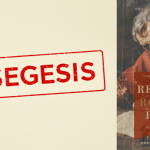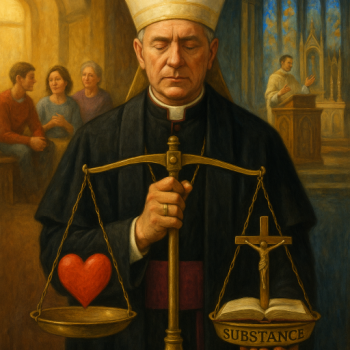
Pride Month is once again here. This month marks a time when our cultural elites demand that we celebrate and affirm the LGBTQ community. Cities like San Francisco, New York, and Chicago host parades; corporations change their logos; government buildings raise flags; and media feeds overflow with demands for not only tolerance but affirmation and celebration. Schools host Pride-themed events, libraries promote LGBTQ literature, and children’s programming is often injected with Pride messaging.
Sadly, voices within the Church now call on Catholics to participate in this celebration. The most prominent among them, Fr. James Martin, S.J., recently encouraged Catholic parishes to celebrate Pride Month in order to “remind our LGBTQ friends that they are welcome in what is, after all, their church, too.”
Such an admonition from a highly influential and ordained Catholic Jesuit raises a serious question: Should Catholics celebrate “Pride”—or fidelity?
Fr. James Martin’s “Yes” to Pride Month
Writing for Outreach, Fr. Martin makes the following emotional appeal for the Church to celebrate Pride Month:
It’s especially important for churches to mark Pride Month since much of the rejection that LGBTQ people have faced has been motivated by Christianity—at least what many people think Christianity teaches. An example: One of the most common reasons for homelessness among LGBTQ teens is that they have been kicked out of their families for ostensibly religious reasons.
Churches have also been places where LGBTQ people have felt insulted, rejected, and unwelcome, a result of the words and deeds of not only some bishops and pastors, but Catholic lay leaders and the faithful. So, it’s important for churches to mark Pride Month and remind our LGBTQ friends that they are welcome in what is, after all, their church, too. [emphasis added]
To Fr. Martin, the Church must “mark Pride Month” to atone for the pain Christianity has caused (and continues to cause) LGBTQ individuals. He offers only vague references to “ostensibly religious reasons” for this rejection, even to the point of youth being kicked out of their homes.
One gets the impression that Fr. Martin views the Church’s teaching on LGBTQ issues—or at least faithful adherence to them—as an ongoing wound inflicted on this community. How else might one understand his concluding suggestion?
Maybe the best way to think about Pride Month is to imagine what you would say to a young person who finally summoned up the courage to tell you that they are LGBTQ. You know that God created them. You know that God loves them. And you know that God wants them to be who they are. So, you would probably say, ‘I am so proud of you for being able to say that.
But in what way did God create them, Fr. Martin? And what does “God wants them to be who they are” mean in the context of Catholic teaching?
Clarifying the “Words and Deeds” — What the Church Actually Teaches
From reading his article, one gets the impression that Fr. Martin subtly equates Church teaching—or at least expressing it—with hate. LGBTQ individuals may feel “insulted, rejected, and unwelcome” when faced with Catholic doctrine on human sexuality and anthropology. Yet these supposed “words and deeds” are not personal cruelty, uncharitable rhetoric, or exclusion from the sacraments without cause. In fact, the Church specifically rejects such actions. As stated in CCC 2358:
They must be accepted with respect, compassion, and sensitivity. Every sign of unjust discrimination in their regard should be avoided.
However, “respect, compassion, and sensitivity” do not mean disregarding or softening Church teaching. The Church calls all people—including those in the LGBTQ community—to chastity, the same virtue expected of every Catholic.
What, then, of Fr. Martin’s call for Catholic participation in Pride Month?
All support should be withdrawn from any organizations which seek to undermine the teaching of the Church, which are ambiguous about it, or which neglect it entirely. Such support, or even the semblance of such support, can be gravely misinterpreted… it is misleading and often scandalous. (Letter to the Bishops on the Pastoral Care of Homosexual Persons, 1986)
Fr. Martin’s advocacy, his writing for Outreach and New Ways Ministry, and his consistent ambiguity and neglect of Catholic teaching—these the Church officially labels as “scandalous.”
Catholics Must Choose Fidelity Over Pride
Fidelity means faithfulness. As Pope Francis stated in 2018: “No human relationship is authentic without fidelity and loyalty.” He continued:
Our fidelity derives from His death and resurrection; constancy in relations derives from His unconditional love. From communion with Him, with the Father and with the Holy Spirit, derives communion among us and the ability to experience the bonds between us in fidelity.
Set against fidelity is pride. Pride elevates one’s desires and self-definition above God’s truth and authority. As Augustine said, “It was pride that changed angels into devils.” The term “pride,” as used in Pride Month, is often an assertion of identity and affirmation in direct opposition to divine and moral order. In contrast, fidelity calls Catholics to remain loyal to God’s revelation—especially in matters of human nature, sexuality, and identity.
Celebrate Fidelity, Not Pride
Rather than causing scandal and confusion, Catholics should celebrate fidelity in the month of June. Initiated by Robert P. George in 2023, Fidelity Month promotes faith, family, and freedom rooted in truth.
You are the most powerful example of human flourishing to a dark, broken world. What are the blessings God has given you? A spouse? Children? Friends? Neighbors? A local congregation? Serve God in them, and tell others about why they are important to you. – fidelitymonth.com
See Dr. George’s message here:
Pray the Fidelity Month Prayer
Almighty and merciful Lord, we praise You and thank You for all You have given us in Your great and unmerited generosity. Please help us to remember who we are, and Whose we are. Grant us the grace to unite as one people in turning back to You with all of our hearts, with all of our souls, and with all of our minds. Cleanse us of all that separates us from You, and help us to cultivate the virtues we need this day and always, so that we may grow in fidelity to You—Who are always faithful—and to our spouses and families, and to our communities and country, and thereby live in accordance with Your holy will. In Your boundless mercy and lovingkindness, Lord, please heal and restore our land.
[Here, you may add a prayer according to your own religious tradition.]Amen.
Final Thoughts…
We must finally address what is truly at stake. Again, quoting from the 1986 Letter to the Bishops on the Pastoral Care of Homosexual Persons:
This Congregation wishes to ask the Bishops to be especially cautious of any programs which may seek to pressure the Church to change her teaching, even while claiming not to do so. A careful examination of their public statements and the activities they promote reveals a studied ambiguity by which they attempt to mislead the pastors and the faithful. [emphasis added]
What is at stake are souls. Figures like Fr. Martin use ambiguity and emotional appeals in place of clarity and fidelity. He urges the Church to repent of its perennial teaching on sexuality and anthropology. A clear first step in that agenda is encouraging Catholic parishes to celebrate Pride Month, thereby rejecting Church teaching and affirming that “God wants them to be who they are”—regardless of what that means doctrinally.
To do otherwise, he implies, is to continue insulting and rejecting LGBTQ persons.
But in truth, Fr. Martin calls for affirmation of an identity that contradicts Church teaching—a contradiction that, if acted upon, imperils souls.
As Catholics, we must celebrate fidelity—not pride—this June.
Thank you!
If you liked this article, please leave your comments below. I am very interested in your opinion on this topic.
Read The Latin Right’s other writing here.
Please visit my Facebook page and IM your questions (and follow my page) or topics for articles you would like covered.
Also, please subscribe my YouTube page for updates on upcoming articles.













